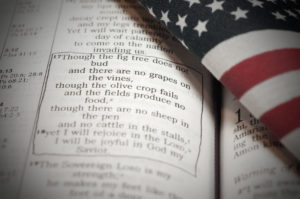Dear American Church: We’re Not an Exception
 Dear beloved American Church,
Dear beloved American Church,
We are beloved, it’s true. But not because we’re American.
Don’t get me wrong — I’m grateful to be an American. I love this country and its freedoms and rhythms and beauty. God has worked in some amazing ways and impacted the world through His people here. But He’s also worked in amazing ways and impacted the world through His people from Korea and Australia and the U.K. and the Netherlands and South Africa and so many other places . . . I’ve seen some of this firsthand as I’ve served alongside faithful believers in international communities.
No, we’re not beloved because we’re American. We’re beloved because we’re part of God’s global family, with brothers and sisters scattered from Uganda and Norway to Venezuela and Myanmar. We’re one small piece of a much larger story.
Yes, there’s a whole lot going on in the U.S. currently and the upheaval is prompting God’s people to pray. That’s a good thing. But the way much of the American Church is praying reveals a deeply self-centered worldview. We’ve had it comparatively easy as Christians here, with abundant material resources and freedom of religion, but none of that is a guarantee for the future.
And that reality can feel scary.
So here we are in another election season, with anxious pastors and leaders calling Christians to get on our knees and beg God to preserve our personal and religious rights so living out our faith doesn’t become difficult. It’s not necessarily a bad thing to pray that we’ll be kept from suffering, but when that becomes one of our primary prayers for the Church in the U.S., it’s time to ask ourselves some tough questions:
What makes us think we’re different than the rest of the Church?
The United States of America is a blip on the timeline of world history. Millennia have come and gone, civilizations have risen and fallen, and Christianity has cycled in and out of favor with countless governments since Jesus told His followers to go and make disciples of all nations. For the majority of Church history, living out the gospel has been costly.
And it still is for many, many believers around the world. Why do we think we inherently deserve ease and comfort in the U.S. when there are pastors in Southeast Asia serving a third or fourth prison sentence for continuing to preach and there are teenagers in the Middle East who’ve been disowned by their families for being baptized? Why do we think we need ministry budgets and slick programs to accomplish God’s work when there are hungry people gathering in dirt-floor sanctuaries, bringing eggs as their tithe? Does God favor us over the millions of Christians who are living in poverty or suffering for their faith?
Do we really understand and believe the whole Bible?
We Americans are pretty adept at sitting on our comfy couches and plucking feel-good verses out of context to share on social media. Recently I’ve seen some heartbreaking misuse of Scripture passages like the first half of Galatians 5:1: “It is for freedom that Christ has set us free” (NIV). I call it heartbreaking because wrapping promises like this in a Stars-and-Stripes paradigm suffocates their true power. The freedom promised here is nothing less than God’s grace that rescues us from sin and self, not freedom from suffering under an oppressive regime.
Nowhere in Scripture are we promised an easy life. In fact, Jesus promised His disciples exactly the opposite: “I have told you these things so that you may have peace. You will have suffering in this world. Be courageous! I have conquered the world” (John 16:33, CSB, emphasis mine).
Someone living in China once told me that the underground Church there is praying for American Christians to taste persecution.
Terrifying, I know.
They’re praying for persecution here, not because they want to see us harmed, but because they know something by experience: enduring suffering strengthens and deepens real faith. The apostle Peter (who, according to tradition, went on to be crucified upside down) understood that God prioritizes the strength and purity of our faith over our temporary comfort:
“You rejoice in this, even though now for a short time, if necessary, you suffer grief in various trials so that the proven character of your faith — more valuable than gold which, though perishable, is refined by fire — may result in praise, glory, and honor at the revelation of Jesus Christ . . . Dear friends, don’t be surprised when the fiery ordeal comes among you to test you as if something unusual were happening to you. Instead, rejoice as you share in the sufferings of Christ, so that you may also rejoice with great joy when his glory is revealed. If you are ridiculed for the name of Christ, you are blessed, because the Spirit of glory and of God rests on you” (1 Peter 1:6-7, 4:12-14, CSB).
Jesus wasn’t playing around when He said, “If anyone wants to follow after me, let him deny himself, take up his cross, and follow me” (Matthew 16:24b, CSB). Living as a true follower of Jesus was never meant to be comfortable.
Where do we anchor our hope?
Imagine for a minute your worst political nightmares coming true. Imagine the U.S. becoming a militantly atheist, socialist nation. Or imagine it becoming an arrogantly cruel, fascist dictatorship. Would God still be faithful to His people?
If powerful people continue to manipulate a broken system to deny justice to the voiceless — will God still be faithful?
If the Constitution crumbles and the Bill of Rights fades into history — will God still be faithful?
If the U.S. descends into war or even ceases to exist altogether — will God still be faithful?
I’ve always been captivated by the story of Shadrach, Meshach, and Abednego, the three Jewish exiles who went toe to toe with King Nebuchadnezzar. The setting was no backwater kingdom. Babylon was a massive center of political, military, and economic power, and the king was its ultimate authority. When Nebuchadnezzar ordered his kingdom to bow down and worship his 90-foot golden statue, nobody argued.
Except Shadrach, Meshach, and Abednego.
These men had been appointed to astonishing positions of political power as managers over the province of Babylon. The king who had shown them favor was just asking for a show of their loyalty in return. And their lives and social influence wouldn’t have been in jeopardy if they had just reluctantly mimicked the posture of the crowd around them and done what was politically expedient.
But they chose the fire instead: “If the God we serve exists, then he can rescue us from the furnace of blazing fire, and he can rescue us from the power of you, the king. But even if he does not rescue us, we want you as king to know that we will not serve your gods or worship the gold statue you set up” (Daniel 3:17-18, CSB).
The fire isn’t the point of this story, though. What matters is what happened in the fire: “Then King Nebuchadnezzar jumped up in alarm. He said to his advisers, ‘Didn’t we throw three men, bound, into the fire? ’ ‘Yes, of course, Your Majesty,’ they replied to the king. He exclaimed, ‘Look! I see four men, not tied, walking around in the fire unharmed; and the fourth looks like a son of the gods’” (v. 24-25).
God didn’t show up to prevent Shadrach, Meshach, and Abednego from being thrown into the furnace.
He joined them in the fire and prevented their destruction — right there in the middle of the flames.
Dear American Church, it’s good and right to pray against evil, to work for change, to speak out on behalf of the vulnerable, to push for justice. But this world is not our home and we cannot carve out a space in it that will hold us safe. Hardship will find us and, yes, persecution may come. So we need to be crystal clear on who we serve.
Do we serve someone who coddles his people or do we serve a God who enters the fire with us?
Does the God we worship offer us ease or does He offer us Himself?
Do we anchor our hope for the future to political platforms, Constitutional Amendments, campaign promises, and social reforms? Do we kneel to power because it promises to smooth our path forward?
Or do we kneel and raise our hands to the One who promises us freedom from sin and self — even when the path to holiness leads through suffering?
No, the American Church is not an exception. And thank God we’re not, because we’d miss out on being part of a story that’s too strong and beautiful and real to belong to any kingdom of this world.



Thank you Beth for writing and reminding us of what the church should truly focus on. A very powerful message!
I have been thinking similar thoughts recently. Many American Christians are more American than Christian, and have shown themselves to be unconcerned with the integrity of leaders as long as those leaders give them a bit of political clout. I can’t imagine anyone being deeply attracted by the American church or saying admiringly of us, “See how they live.”
So good!!!!I have not got serious about the what if’s. Us in America feel superior to other countries. Yes , aren’t we the best and of course God will swoop in and make it all right. Just praying will do it because we are so loved. We need to hold tight to Gods word and pray for strength. Who knows what , when and where our souls will depend on it.
Love you Beth
Thank you Beth for this stretching, yet Biblical post.
Beautifully said and thank you for encouraging in the light of the scripture on its context.
Thank you for sharing truth
Powerfufl! This is so true. Our hope is in God, not who wins elections or keeps us comfortable.